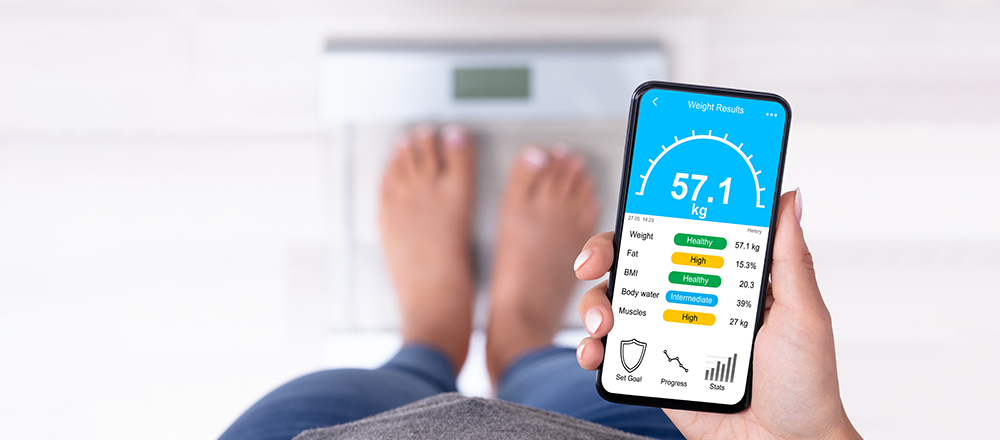The Skinny on Smart Scales
August 17, 2021By: Leia Darden
Categories: Live Healthy, Nutrition, Weight Loss Management, Your Wellness

Our everyday lives consist of smartphones, smart speakers, smart cars and, now, smart scales. Smart scales are electronic devices that provide a more comprehensive look at your health. Unlike traditional dial or digital scales, smart scales can capture additional body composition metrics.
How Smart Is the Scale?
Features may vary by scale, but many of today’s models track everything from body fat percentage (fat- to-lean tissue ratio), muscle mass (amount of muscle in body) and bone mass (amount of bone in body) to how much water your body is holding. Some scales can even track your resting heart rate, protein level and metabolic age. Depending on the model, this data can be transmitted to other devices or health apps.
How It Works
Most smart scales are powered by sensors under your feet that use bioelectrical resistance. When you step on the scale a small electrical current runs through your leg and across your pelvis, measuring the level of resistance the current meets as it travels back through your other leg. As a rule of thumb, greater body resistance indicates a higher body fat percentage because fat contains less water than muscle, so it’s denser and more difficult for a current to travel.
Pro Tip: The more water in your system, the more accurate the body composition measurement.
Benefits of a Smarter Scale
The greatest benefit is that you can measure your weight and key body metrics at your convenience – no physical needed! Having this information at your fingertips gives you a fairly accurate snapshot of your body composition at a particular point in time, making it easier to measure progress and achieve your health goals.
Related reading: Smart Speakers
A Word of Caution
- The information you get from smart scales is not 100% accurate!
- Smart scales only capture your overall percentage of fat, not where your body is storing potentially dangerous fat.
- For example, body fat that’s concentrated around your midsection is concerning because it increases your risk for health conditions like heart disease.
- Pregnant women and people with pacemakers should disconnect the electrical impulse feature before weighing themselves.
Tips for Scaling Up
It’s important to do your research when selecting a smart scale. With countless models to choose from and a spectrum of price points, you should let your budget and needs guide your selection. While some smart scales may have all the bells and whistles, the most important thing is getting an overall picture of your body composition.
Beyond the Scale
Many studies have shown a correlation between self-weighing with a smart scale and weight loss, but sometimes you need an extra hand along the way. From personal training and nonsurgical weight loss services to bariatric surgery, NKCH is here to help you on your road to wellness.



